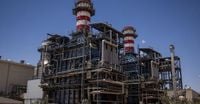In a significant development for Syria’s energy crisis, Türkiye is set to commence the supply of natural gas from Azerbaijan to Syria starting August 2, 2025. This marks the first such energy transfer since the onset of Syria’s civil war in 2011, signaling a new chapter in regional cooperation and Syria’s reconstruction efforts.
Energy Minister Alparslan Bayraktar announced on Wednesday, July 30, 2025, that the natural gas will be delivered to Aleppo via the Kilis province in southernmost Türkiye, near the Syrian border. This initiative follows a deal reached in May 2025 between Turkish and Syrian officials, underlining the growing diplomatic and economic ties between the two nations in the post-conflict era.
Bayraktar explained that the supply will be facilitated through a swap deal with Azerbaijan, supported by financing from Qatar. He stated, “We will begin exporting the gas coming from Azerbaijan to Syria, to Aleppo, via [Turkey’s border city of] Kilis.” The initial volume of gas is expected to be around six million cubic meters per day, which is projected to generate up to 1,200 megawatts of electricity for Syria.
On the Syrian side, Energy Minister Mohammad al-Bashir confirmed that the initial gas volumes would be 3.4 million cubic meters per day, enabling the production of approximately 900 megawatts of power. This supply is aimed at mitigating Syria’s chronic electricity shortages, where many households currently receive only three to four hours of electricity daily.
The restoration of the Kilis–Aleppo gas pipeline was completed in May 2025, paving the way for this much-needed energy flow. This development comes just months after a new Syrian administration took control following the ousting of former President Bashar al-Assad in December 2024. The new government has prioritized rebuilding essential infrastructure and addressing acute energy needs to stabilize the country.
During Syrian President Ahmed al-Sharaa’s official visit to Baku earlier in July 2025, the State Oil Company of Azerbaijan Republic (SOCAR) signed a memorandum of understanding with Syria. This agreement, coordinated via Türkiye, marks a significant step in Azerbaijan’s increasing involvement in Syria’s economic revival and energy sector.
Bayraktar highlighted the broader scope of cooperation, recalling his May 2025 visit to Damascus, where he signed an agreement with al-Bashir to supply Syria with up to two billion cubic meters of natural gas annually, alongside 1,000 megawatts of electricity. The goal is to boost energy availability in Syria to last for up to 12 hours a day, a dramatic improvement over current conditions.
In addition to the gas supply, Bayraktar noted a separate transmission line designed to export up to 500 megawatts of electricity from Türkiye to Syria is awaiting repairs on the Syrian side, with funding provided by the World Bank. Once operational, this line could increase Syria’s electricity supply to nearly 900 megawatts, enough to meet the needs of around 1.6 million households.
Bayraktar emphasized the humanitarian impact of these efforts, stating, “The electricity needs of around 1.6 million households there will be met,” adding that improved energy access could accelerate the return of Syrians currently living in Türkiye. Türkiye hosts nearly three million registered Syrian refugees, with the number of unregistered Syrians remaining unknown.
This new energy partnership also reflects a shift in Türkiye’s role in Syria. Throughout the 13-year civil war, Ankara supported rebel forces opposed to Assad’s regime. However, with the conflict’s end and the emergence of a new Syrian government, Türkiye has repositioned itself as a key ally in Syria’s stabilization and reconstruction, especially in the energy sector.
Before the conflict escalated, Syria relied heavily on oil imports from Iran for power generation. However, following the rise of Hayat Tahrir al-Sham in December 2024, these supplies were disrupted, exacerbating Syria’s energy crisis. The new natural gas supply from Azerbaijan via Türkiye is expected to help fill this void and stabilize the country’s power grid, which was devastated by nearly 14 years of conflict.
Bayraktar also noted that the natural gas supply would fuel existing power plants across Syria, enhancing electricity production capacity. “With the six million cubic meters of gas that we are planning to send there, we will be able to realise 1,200 megawatts of electricity production,” he said, adding that Türkiye would supplement this with an additional 500 megawatts of electricity.
To mark the commencement of the gas flow, a trilateral ceremony will be held on August 2, 2025, in Kilis, attended by energy ministers from Türkiye, Syria, and Qatar. The event symbolizes the collaborative effort to address Syria’s energy challenges through regional partnership and international support.
Qatar’s financial backing of the project underscores the broader Gulf interest in stabilizing Syria and supporting reconstruction efforts. The increased energy supply aims to raise daily electricity availability from the current three to four hours to approximately ten hours, significantly improving the quality of life for millions of Syrians.
This development is a beacon of hope for a country long battered by war and deprivation. Reliable electricity is essential not only for households but also for hospitals, schools, businesses, and the overall economy. As Syria embarks on this new phase of rebuilding, energy cooperation with Türkiye, Azerbaijan, and Qatar could play a pivotal role in restoring normalcy and fostering regional stability.
While challenges remain, including infrastructure repairs and security concerns, the natural gas supply deal represents a crucial step toward addressing Syria’s energy deficit. It also exemplifies the shifting geopolitical landscape in the region, where former adversaries are now collaborating to rebuild a fractured nation.
As the gas begins to flow through the Kilis-Aleppo pipeline this August, many Syrians will be watching closely, hopeful that this initiative will bring light—both literally and figuratively—to their homes and communities after years of darkness.





